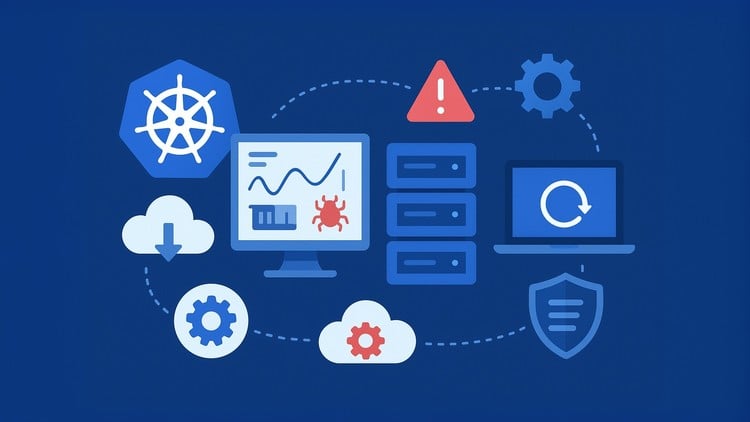
Test failure recovery & cluster resilience using Chaos Mesh & Litmus. Core for CKS certification
👥 4 students
Add-On Information:
Note➛ Make sure your 𝐔𝐝𝐞𝐦𝐲 cart has only this course you're going to enroll it now, Remove all other courses from the 𝐔𝐝𝐞𝐦𝐲 cart before Enrolling!
- Course Overview
- This advanced course uniquely merges the critical domains of Kubernetes CKS (Certified Kubernetes Security Specialist) preparation with cutting-edge Chaos Engineering principles. Designed for those seeking to not only secure their Kubernetes clusters but also validate their resilience against real-world failures, it provides an unparalleled learning experience.
- Delve into the proactive methodology of Chaos Engineering, moving beyond traditional security audits to actively test system robustness and failure recovery mechanisms within a Kubernetes environment. Understand how intentional disruptions can reveal hidden vulnerabilities and strengthen operational stability.
- The curriculum strategically focuses on the CKS certification objectives, ensuring every concept of securing a Kubernetes cluster, from API server access to runtime security, is thoroughly explored and then rigorously tested through chaos experiments.
- With an extensive bank of 1500 certified questions, this course is meticulously crafted to solidify theoretical knowledge, provide practical application scenarios, and prepare students comprehensively for the CKS exam, going beyond mere memorization to foster deep understanding.
- Explore the integration of security best practices with resilience engineering, demonstrating how a secure cluster is inherently more resilient and how a resilient cluster better withstands security incidents. This holistic approach ensures robust, production-ready deployments.
- Learn to leverage leading Chaos Engineering tools like Chaos Mesh and Litmus Chaos to simulate a wide array of failure scenarios, including network partitions, node failures, resource exhaustion, and application crashes, all within a controlled and observable environment.
- Requirements / Prerequisites
- A solid foundational understanding of Kubernetes concepts and operations, ideally equivalent to the CKA (Certified Kubernetes Administrator) or CKAD (Certified Kubernetes Application Developer) certification level.
- Proficiency with Linux command-line interface and basic shell scripting for managing cluster resources and executing commands.
- Familiarity with YAML for defining Kubernetes objects and manifests is essential for both security configurations and chaos experiment definitions.
- Conceptual understanding of distributed systems and microservices architecture will be beneficial for grasping the complexities of failure modes.
- Access to a stable internet connection and a computer capable of running virtual machines or a cloud account (e.g., AWS, GCP, Azure) for hands-on lab exercises.
- While no prior Chaos Engineering experience is strictly required, an open mind for experimentation and a desire to challenge system assumptions are crucial.
- Skills Covered / Tools Used
- Advanced CKS Security Domains: Master Pod Security Standards, Network Policies, Kubernetes API server security, Role-Based Access Control (RBAC), Image Security, Supply Chain Security, and Runtime Security tools like Falco and AppArmor/Seccomp.
- Chaos Engineering Methodologies: Formulate hypotheses, define steady-state, establish blast radius, conduct controlled fault injection, and analyze experimental outcomes to drive system improvements.
- Chaos Mesh Mastery: Deploy and configure Chaos Mesh, implement various chaos types including PodChaos, NetworkChaos, StressChaos, DNSChaos, and cloud-specific chaos (AWSChaos, GCPChaos, AzureChaos), and schedule recurring experiments.
- Litmus Chaos Proficiency: Install and manage Litmus Chaos, design and execute complex chaos workflows using Chaos Experiments and Chaos Workflows, and interpret Chaos Results for effective incident analysis.
- Observability Integration: Integrate Chaos Engineering with monitoring tools like Prometheus and Grafana to visualize system behavior under stress, correlate metrics with fault injections, and identify performance bottlenecks.
- Incident Response Simulation: Practice diagnosing, mitigating, and recovering from simulated failures, thereby enhancing your team’s incident response capabilities and reducing MTTR (Mean Time To Recovery).
- Secure Configuration Validation: Utilize chaos experiments to validate the effectiveness of implemented security controls, such as network segmentation, resource quotas, and admission controllers, under adverse conditions.
- Automated Resilience Testing: Learn to embed chaos experiments into your CI/CD pipelines, enabling continuous validation of application and infrastructure resilience as part of your development lifecycle.
- Kubernetes Troubleshooting & Debugging: Enhance skills in identifying root causes of cluster instability, resource contention, and application failures through systematic observation and experimentation.
- Benefits / Outcomes
- Achieve a deep, practical understanding of Kubernetes security and resilience, making you exceptionally well-prepared for the CKS certification exam and beyond.
- Gain the ability to design, implement, and critically analyze sophisticated chaos experiments that uncover hidden weaknesses in distributed systems.
- Develop and deploy highly resilient, secure, and self-healing Kubernetes clusters capable of withstanding various failure modes and security threats.
- Master the use of industry-standard Chaos Engineering platforms (Chaos Mesh, Litmus Chaos), adding valuable, in-demand skills to your technical repertoire.
- Solidify theoretical knowledge through an extensive bank of 1500 certified practice questions, ensuring mastery of concepts and exam readiness.
- Elevate your professional standing as a go-to expert in Kubernetes security, reliability, and incident prevention, making you a critical asset to any team.
- Contribute directly to the stability and security of mission-critical applications by proactively identifying and addressing potential points of failure.
- PROS
- Exceptional depth and breadth in both CKS security objectives and practical Chaos Engineering application.
- The unparalleled volume of 1500 certified questions provides exhaustive practice for the CKS exam.
- Hands-on experience with industry-leading tools like Chaos Mesh and Litmus Chaos ensures practical skill development.
- Bridges the crucial gap between securing a system and proving its resilience under duress.
- Focuses on proactive failure prevention rather than reactive incident management.
- Highly relevant for modern cloud-native environments and DevOps professionals.
- CONS
- The extensive content and rigorous practice requirements demand a significant time commitment.
Learning Tracks: English,IT & Software,IT Certifications
Found It Free? Share It Fast!